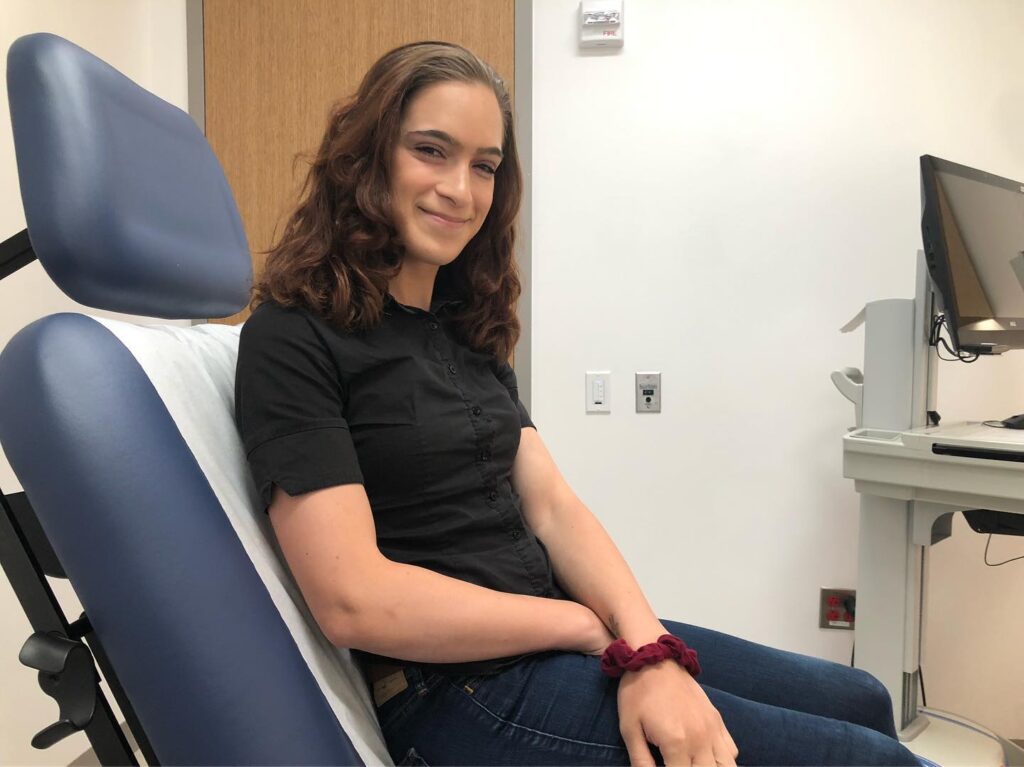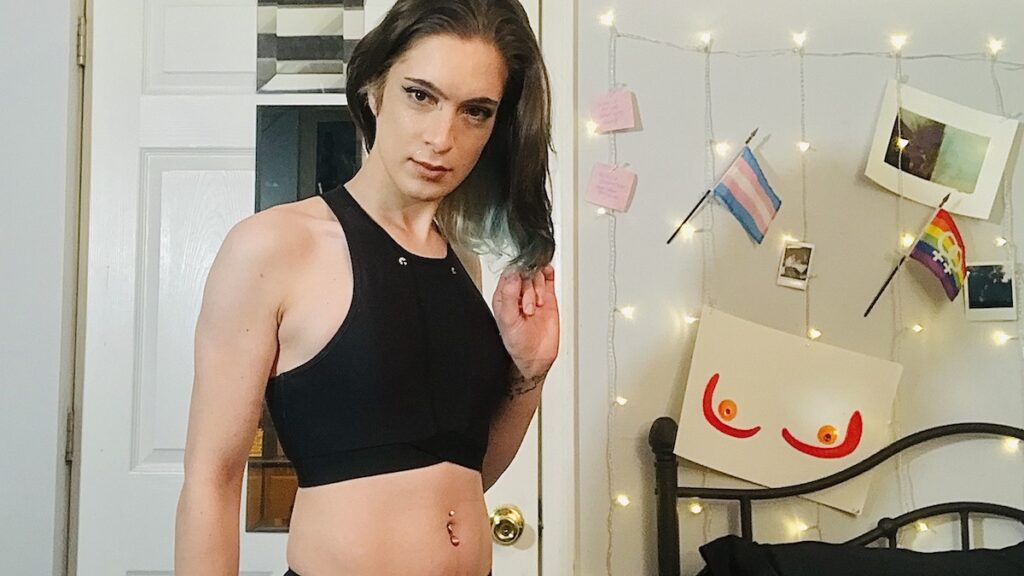CW: This post is a candid, raw, and vulnerable account of my doubts and fears surrounding bottom surgery. Potential triggers include gaslighting, genital mention, bottom surgery/vaginoplasty, cissexism, and dismissal of trans identity.
I am under no illusion that gaslighting and the consequent battle against debilitating self-doubt are experiences specific to trans people. Gaslighting is painfully common, and many people (disproportionately BIPOC + non-male, disabled, and/or neurodivergent people) regularly fall prey to these insidious tactics. If you’d like to speak with a professional about your experiences with gaslighting, get connected with an inclusive therapist via BetterHelp. In this post, I aim only to convey my own experiences, along with observations of societal responses to other trans folks, as we attempt to navigate and communicate our lived realities.
If you’d like a way to support this work, I encourage you to check out my Patreon, share this post on social, and/or give the podcast a 5 Star Review on iTunes.
It’s been a while since I’ve written on here. That’s partly because creating and producing the podcast has taken up most of my creative juice, but to be totally transparent, I’ve also been struggling with something major.

Those of you who’ve followed this blog since its inception might remember my very first post, “You’re ‘Really Trans’ Now! Congrats on the New Vagina.” I shared this post in the weeks following my first consultation for bottom surgery, declaring that I was finally confident about going through with my operation. I also used it as an opportunity to call out the way that cissexism creates unrealistic expectations of trans people, as well as dismantle the assumption that bottom surgery is just a natural part of a trans feminine person’s transition.
Tl;dr, it isn’t.
To assume that every trans person wants, needs, or is even able to access bottom surgery (or surgeries in general) is to have a monolithic view of the trans community. In reality, trans experiences vary just as drastically as anyone else’s.
It’s now been well over a year since that first consultation. Since then, I’ve had a ton of time to reflect on my decision, as well as interrogate my own internalized cissexism. Am I confident that my decision about bottom surgery is rooted in my own desires? Or have I allowed my decision to be influenced by years of society perpetuating the narrative that women with vaginas are inherently more valid than women without?
To be honest, I don’t know that these questions have clear answers. I’m not sure it’s possible to completely divorce my own understanding of myself and my body from society’s narrative, because my own self-perception has been systematically molded by a ciscentric society since the day I was born. It’s hard to retroactively undo that impact.
Still, I decided that it was probably a mix of both reasons and left it at that. However, as my bottom surgery date grew closer, doubt crept in with renewed vigor.

Most notably, I was terrified at the realization that I didn’t feel pure, unadulterated bliss at the thought of no longer having a penis. In fact, part of me was actually saddened by the thought of that loss.
Up until the early 2000s, this sadness would likely have disqualified me as a candidate for bottom surgery (in many places, it still would). Though this is not a criterion set forth by my doctor, it still sent me into a bit of a tailspin.
“Surely, this must be a sign that bottom surgery is the wrong decision,” I thought, and the fear that I could be filled with regret following my operation took root somewhere deep inside me.
How could I trust myself to make a fundamentally irreversible decision with so much fear and uncertainty still stewing inside me? Even if I were to land on a choice, how could I ever fully trust that I’d made the right one?
Then came the bewildering realization that I was equally terrified of both outcomes: cancelling bottom surgery and having to continue living with a penis, as well as deciding to go through with it. How could each of my choices feel so wrong, so scary, both at the same time?
Loved ones attempted to comfort me by insisting I need only trust my gut. They were unaware that my gut was playing tug-o-war on an infinite loop, forever vacillating between option A and option B.
By this past summer, I had all but made the decision to cancel. At the urging of my mother and a few close friends, I decided to hold onto my bottom surgery date until I absolutely had to choose. It would sure be a shame if I changed my mind back, only to then have to wait another two years for the next open date.
I decided that my only hope of making peace with my decision was by returning to therapy. I also recognize that access to trans-competent therapy (or therapy at all, for that matter) is a huge privilege, and I am immensely grateful for the opportunities I’ve been granted.
In last Friday’s session, I had a monumental breakthrough. After months of trying to unpack and untangle my absolute mess of emotions, I was finally able to name my fears succinctly.
What I realized is this:
It is not just that I am afraid of having bottom surgery at all (I am, though, it’s fucking scary).
It is not that I am afraid bottom surgery will be a mistake.
It is that years of being gaslighted about my own realities has gradually eroded away my ability to trust my own judgment.
I am not simply afraid that having bottom surgery would be the wrong decision. Rather, I am afraid that no matter what I choose, I would somehow be wrong.
Once I understood my fear, I began to make connections to other areas of my life, including my time at Carlbrook School. I’ve spoken at length about this experience, so I won’t bother getting into all the dirty details now. The tl;dr is that my therapist outed me to my parents, who were subsequently assured that my coming out had been a ploy for attention, and I was then denied the right to transition. My family held onto their misguided perspective for nearly a year after I graduated, and my father used Carlbrook’s anti-trans rhetoric to gaslight me.
When I decided that I wanted to undergo facial hair removal before publicly coming out again, my father remarked that I should “really think about it before making such a permanent change.” When I expressed interest in starting hormones, loved ones warned that “hormones are dangerous” (false), “possibly cancer-causing” (also false), and “why would [I] want to do something so permanent to my body” (because I am f u c k i n g t r a n s g e n d e r, that’s why).

On several occasions, this continued distrust of my self-knowledge led me to question whether I’d made the whole thing up.
Though totally baseless and completely unfounded, anti-trans rhetoric is highly infectious. As recently as last week, when I shared a post on Instagram about my surgery fears, strangers crept into my inbox en masse to share their opinion that bottom surgery is wrong/dangerous/absurd.
And I’m far from the only trans person who’s had this rhetoric weaponized against me. Over the past five years, I’ve had the immense honor of coaching a number of trans people through their coming out processes. Although many of their families ultimately came to support them, they each struggled to varying degrees to initially accept the reality of their child’s truth.
Some of this is to be expected. It’s totally valid for families to take time to process their emotions about a child’s identity, and holistic acceptance is rarely (if ever) instantaneous.
How this often becomes intensely traumatizing is when families project this doubt onto their child and/or weaponize their disbelief in order to deny them support (emotional, financial, spiritual, and/or otherwise).
Mental health practitioners who are well-versed in trans issues generally understand that we are the best judge of our own realities; They affirm that we know ourselves better than other people know us. While this sounds obvious, that doesn’t prevent people from gaslighting us when we express a desire to pursue a new stage in our transition.
When trusted loved ones (or even strangers, for that matter) continuously question or deny that we know what is best for us, it becomes increasingly difficult to trust our own judgment and perception.
Until last week in therapy, I didn’t understand how intricately my deeply-ingrained self-doubt was interwoven with my bottom surgery anxiety (side note: Last Week in Therapy would be a really great name/theme for a podcast. No relation to Last Week Tonight, I promise. DM if you want to create this with me lol).
As I came to this revelation, I felt tears on my cheek before I noticed I was crying. Though I remain intensely fearful about the “what ifs” of bottom surgery, a discernible heaviness lifted from my chest. By naming my fear, I am finally able to face it head-on.

As my session ended, my therapist urged me to sit with myself for a bit before returning to my afternoon (which, in my present furlough, usually means cooking or baking). I picked up my journal for the first time in months and wrote a list called “Bottom Surgery Affirmations,” to be read and reread whenever I inevitably fall back into a pattern of doubting my own judgment.
Bottom Surgery Affirmations – 12/4/2020
“You’ve worked hard to be comfortable with your body the way it is. Going through with bottom surgery does not mean this work wasn’t worth it.
You don’t hate your penis anymore because you worked really hard to make peace with it. That does not mean that you want it or that you have to keep it.
You may kind of miss your penis – you may mourn the loss of the familiar + the presence of something that’s just always been there. That does not mean that surgery is the wrong decision.
You are going to be scared. You need to hold space for that and allow yourself to process it. Try DBT again. Write more. Maybe even write just for yourself.
Everything you have done up until this point is still worth it – it still matters.
You can trust yourself. The people who have told you that you can’t or shouldn’t were wrong – they were gaslighting you, abusing you, making you doubt your every decision.
How many of your issues in life come back to that same damn problem – an inability to trust yourself? To trust your own judgment and perceptions?
That’s why you’re afraid people secretly hate you – because you’re afraid that to believe that they actually like you is to trust your own inherently faulty perception of the situation.
That’s why you worry that the work you do isn’t good or valuable – because you don’t trust that you’d be able to tell if you were doing something wrong.
And that’s why you’re so scared to make any decision about bottom surgery – because you’re afraid that, either way, you can’t trust that you’ve made the right decision.
But maybe there isn’t even a “right” decision – just your own ability to trust that you know what’s best for yourself, and that you would never make a big decision without thinking it through from every possible angle.
Even at your best, you’ve never truly enjoyed your body – not as a testosterone-fueled teen, not as an estrogen-fueled adult. Why not take this (admittedly scary) leap into faith, with the hope + possibility that what’s waiting for you on the other side is the sense of peace and oneness with your body that you’ve always dreamed of?
Why not grant yourself the kindness to give yourself that chance?
Maybe it won’t be perfect, but neither is this. But at least then, you’ll have a chance at the life you’ve envisioned for yourself.
Love yourself, be kind to yourself. Hold space for your fears, and trust that whatever decision you make – that decision will be the right one.”


I honestly don’t know if I have ever loved my body
Those of us who argue for bodily autonomy, even if we go through with gender affirmative surgeries, are no less valid in our arguments. As much as I have learned to live contently with my vagina following the failure to get meta due to a botched hysto, I still may pursue phalloplasty someday. Even though the options and techniques keep improving, I got too many other things on my plate to worry about it right now—career growth, dating, aging parents, reconnecting and re-establishing friendships I’ve let languish, saving up to move out. It’s something that could improve my quality of life, but it’s not something I need to improve it. I’ve shown I’m “more of a man” to more people than many men think they’re men just because they turned 18 and have their cock and balls. I’m lucky I saved on therapy to come to that realization, because I found the cognition for it instead through Instagram and trans-positive porn.
And the people who question my masculinity or male identity? I just publicly shame them on the spot, in front of the people who know us both.
I’m glad you’ve found peace with your decision, Charlie! You are valid!
Thanks for sharing your thoughts from your journal on your upcoming surgery. You should know you have helped me feel more confident in my decision to go through with my upcoming bottom surgery in 2022. Like you have said, my fear of deciding either way is more about my fear of my making yet another bad decision in my life. Put aside that fear, and I certainly want to feel the validation of my body finally conforming to my life long identity as a female.
I’m so happy to hear that you’ve come to a decision that feels right to you!!! I’m so glad to hear you’ve found a way to trust yourself, that’s such a powerful shift.
Pingback: A Bottom Surgery Chronicle: All My Dysphoric + Euphoric Musings on Vaginoplasty, 2019-Present • Trans & Caffeinated